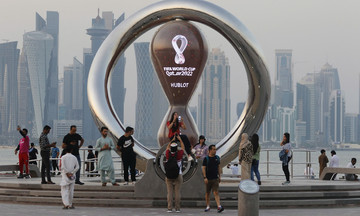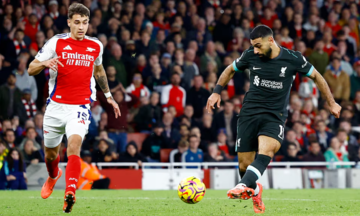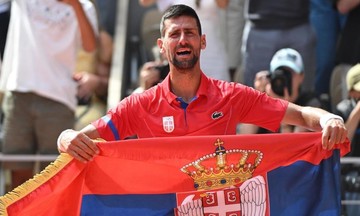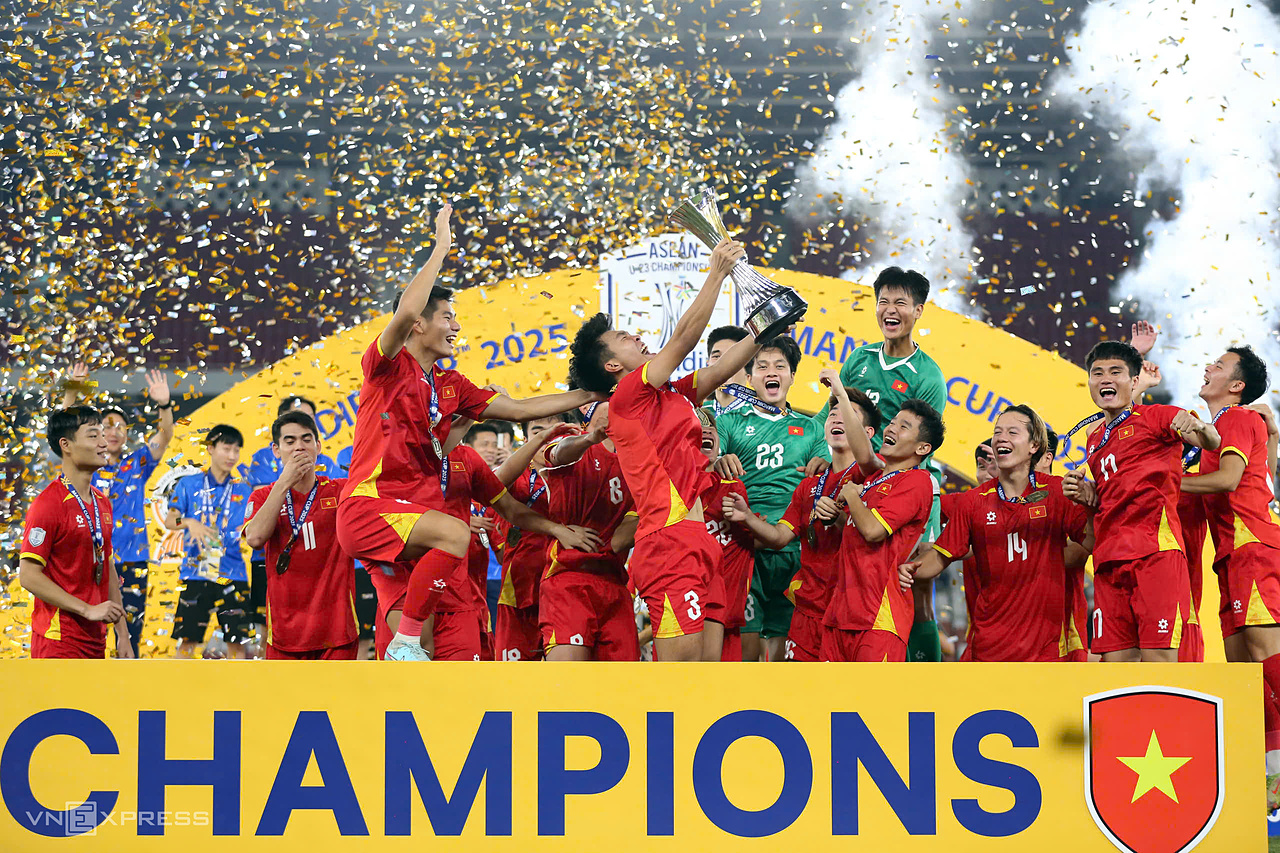 |
Vietnamese players lift the trophy at Gelora Bung Karno Stadium, Jakarta, Indonesia, 29/7/2025. Photo: Hai Tu |
Among the 10 participating teams, Vietnam's preparation was the most thorough compared to rivals Thailand, Indonesia, Malaysia, and the Philippines. The team assembled on 26/6 in Ba Ria Vung Tau (now TP HCM), allowing for over three weeks of training before their opening Group B match against Laos.
Vietnam also had two practice matches against Chinese Taipei, an advantage Thailand, Indonesia, and the Philippines lacked. Malaysia played three matches against local club youth teams. In fact, Vietnam's preparation began in 9/2024. In the nine months leading up to the tournament, the team had two high-quality friendly periods in China, facing the host nation, South Korea, Uzbekistan, and Malaysia.
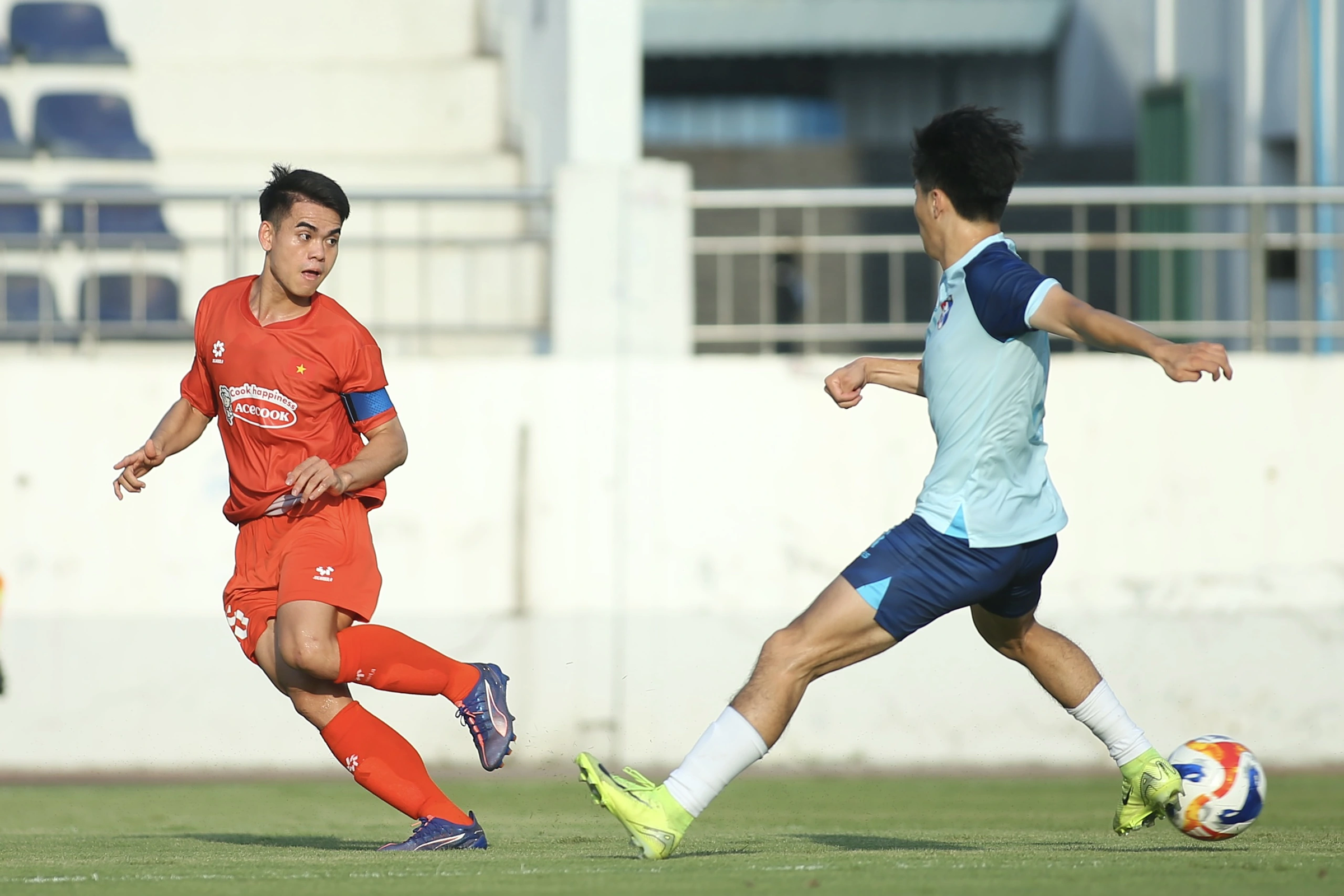 |
U23 Vietnam (in red) defeated U23 Chinese Taipei 2-1 in a practice match at Ba Ria Vung Tau Stadium, 4/7/2025. Photo: VFF |
Vietnam also benefited from the draw and the match schedule. As the defending champions, they were placed in a three-team group with Cambodia and Laos, considered the easiest among the second and third seeds.
Vietnam defeated Laos 3-0 and Cambodia 2-1 before overcoming the Philippines 2-1 in the semi-final. Indonesia's only comfortable victory was their 8-0 opening win against Brunei in Group A. They then narrowly beat the Philippines 1-0 thanks to an own goal and drew 0-0 with Malaysia. In the semi-final, they battled for 120 minutes to a 1-1 draw with Thailand before winning 7-6 on penalties.
Vietnam’s superior fitness proved advantageous in the final. At the Gelora Bung Karno Stadium on the evening of 29/7, Indonesia couldn't maintain sufficient pressure in the final 15 minutes as their players visibly tired.
Vietnam's performance improved with each match. They largely controlled the games, with opponents only creating brief moments of concern, such as Cambodia's equalizer or the Philippines' opening goal.
| Road to the U23 Southeast Asian Championship Final | |||||
| Vietnam | Indonesia | ||||
| Date | Match | Minutes | Date | Match | Minutes |
| 19/7 | 3-0 Laos | 90 | 15/7 | 8-0 Brunei | 90 |
| 22/7 | 2-1 Cambodia | 90 | 18/7 | 1-0 Philippines | 90 |
| 21/7 | 0-0 Malaysia | 90 | |||
| 25/7 | 2-1 Philippines | 90 | 25/7 | 1-1 Thailand (7-6) | 120 |
The team's aerial prowess and set-piece coordination were unexpected strengths. Coach Kim's squad boasted good physicality, with around six players over 1.8m tall on the field at any given time.
Vietnam scored only one goal from open play. The remaining seven goals came from aerial balls, four directly from headers. The left flank, with Khuat Van Khang and Nguyen Phi Hoang, proved particularly effective, contributing to six goals.
Meanwhile, Vietnam's defense, anchored by goalkeeper Tran Trung Kien (1.91m), along with Pham Ly Duc (1.82m), Nguyen Hieu Minh (1.84m), Nguyen Nhat Minh (1.75m), and Nguyen Van Truong (1.82m), proved a formidable barrier. Despite conceding two goals, the defensive line displayed resilience and solidity, especially against an equally aerial-minded opponent like Indonesia.
Before the tournament, coach Kim's only personnel change was replacing the injured striker Nguyen Thanh Nhan with Le Van Thuan. His decision to drop national team regulars Ho Van Cuong and Nguyen Hong Phuc raised eyebrows, but the performances of Nguyen Phi Hoang and Vo Anh Quan justified his choices.
Coach Kim Sang-sik and his staff also demonstrated tactical astuteness. In the semi-final, they ceded possession to the Philippines, neutralizing their counter-attacking threat. Conversely, Vietnam became the team to counter-attack, creating several excellent first-half chances.
In the final, they anticipated Indonesia's long throw-in tactic and applied psychological pressure after taking the lead. The coaching staff's use of towel signals and the late-game water bottle incident also drew attention.
As in the 2024 ASEAN Cup, Kim effectively rotated his squad. Only goalkeeper Nguyen Tan, Cao Van Binh, and center-back Nguyen Duc Anh didn't feature. Substitutions like Dinh Bac against Cambodia, and starting opportunities for Xuan Bac and Cong Phuong, all yielded positive results.
Finally, the introduction of VAR in the final – a first for the U23 Southeast Asian Championship – impacted both teams. Indonesian football expert Justin argued that VAR reduced the tension compared to initial expectations. "The match would have been highly unpredictable if there were refereeing errors. But with VAR, gamesmanship from the players was virtually absent," he told Bola.
Indonesian media also highlighted the "curse" of the Gelora Bung Karno Stadium, where no Indonesian national team has lifted a trophy in 38 years. Their last triumph there was the 1987 SEA Games men's football gold medal. Since then, Indonesia has lost finals at the 1997 and 2011 SEA Games, and the 2002 and 2010 AFF Cups (now ASEAN Cup).
Hieu Luong





